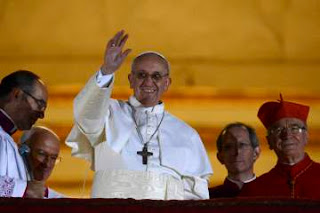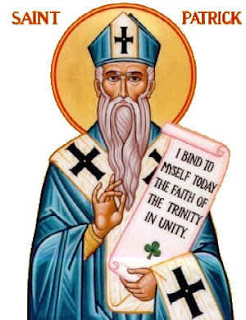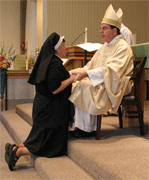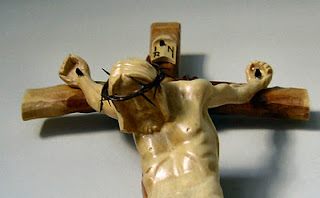 Well, the day before yesterday was one of those days where amazing things happen ALL day long. First, there was the inauguration of a Pope who holds the poor and marginalized in his heart and gives them priority in his theology and pastoral focus --- the first inauguration since that of John Paul I where I felt true excitement and hopefulness for the papacy, the reform of the curia, and the eventual health of the Church; it was the first inauguration where I was moved by the simplicity (and beauty) of the liturgy, the vestments, etc, and so, was reminded of the Christ I know myself. It was an inauguration in which I heard the Gospel proclaimed in Greek --- which took me back to school days --- and where the Homily spoke of caring for creation and one another as good stewards of God's own love and life in what was a typically Franciscan way.
Well, the day before yesterday was one of those days where amazing things happen ALL day long. First, there was the inauguration of a Pope who holds the poor and marginalized in his heart and gives them priority in his theology and pastoral focus --- the first inauguration since that of John Paul I where I felt true excitement and hopefulness for the papacy, the reform of the curia, and the eventual health of the Church; it was the first inauguration where I was moved by the simplicity (and beauty) of the liturgy, the vestments, etc, and so, was reminded of the Christ I know myself. It was an inauguration in which I heard the Gospel proclaimed in Greek --- which took me back to school days --- and where the Homily spoke of caring for creation and one another as good stewards of God's own love and life in what was a typically Franciscan way.
I was taken back to school days too when, in the afternoon, I went to a symposium at my old college on Vatican II featuring the Church historian Massimo Faggioli speaking about his book, The Battle for Meaning. Also in attendance were Bp John Cummins (Bp Emeritus of the Diocese of Oakland) and Bp Remi De Roo (Bp Emeritus, Victoria, BC and a Bishop who attended all four sessions of Vatican II). Now, some readers of this blog may recognize Bp Remi's name from pieces I have written on the history of Canon 603, especially for his intervention at the Second Vatican Council on the contribution of the eremitical life to the life of the Church. (cf the labels to the right and below for associated articles here) I had never met Bp De Roo, but I had read his intervention at the Council and he has been something of a hero of mine because of his support of the eremitical vocation.
So, I had emailed a Brother at the college and asked if there might be a chance to meet Bp De Roo to thank him for his place in establishing this vocation in the contemporary Church. That was arranged and I was able to hear the story from him directly, a story I have told here before and will summarize again: When religious were forced to leave their congregations and vows in order to follow a call to eremitical solitude Dom Jacques Winandy, a Benedictine monk and (eventually) another 11 or so of them ended up on Bp Remi's doorstep. He was named Bishop protector of a project allowing these hermits to live in a laura (individual dwellings, etc.) and try to live this vocation. It was the beginning of a resurgence of the eremitical vocation in the Latin Church. Later he gave (wrote) one of the interventions at Vatican II and, though none of the Council documents included eremitical life, the Revised Code of Canon Law (1983) recognized the vocation in canon 603 partly as a result of Bp Remi's efforts.
 |
| Bishop Remi De Roo |
At the evening presentation Bp Remi, along with Bp John Cummins and Massimo Faggioli spoke of the greatest achievements of Vatican II as well as what was still to be done in their estimation. Bishop De Roo spoke first of his conclusion that what John XXIII had wanted to happen with Vatican II HAD happened, namely, a new Pentecost. He developed the same ten points as signs of this achieved new Pentecost as he used to indicate what was still necessary, namely, our need to develop a spirituality of Vatican II. The ten points marking both achievement and remaining need? 1) a view of revelation centered in the person of Jesus Christ, not in propositions, 2) reclaiming and reading the Scriptures as the basis of our spirituality, 3) the recognition that real sanctity is a question of relationships, first with God and then with all others, 4) reclaiming our Baptismal dignity, especially a sense of the priesthood of all believers. Here Bp Remi reminded us there is only one "class" in our Church, that of disciple of Christ.
He continued: 5) a redefinition of the nature of genuine morality in terms of responsible freedom rather than as a matter of embracing moral precepts. Here Bp De Roo stressed the uniqueness of the conciliar statements on conscience --- not in terms of content, for that was entirely traditional, but in terms of the Council affirming this teaching clearly in its own documents; 6) A morality measured in terms of co-responsibility for all. (Bp Remi reminded us of Vatican II's statement that the laity/laos (the whole People of God) has right and sometimes the obligation to speak to pastors regarding their needs), 7) the commitment to the Kingdom or Reign of God. The Church is here as a servant of this one single work, the building of the Kingdom. Thus, the Church is always to be about dying to self so that God's Kingdom might truly come; (this was also the topic of Bp Remi's homily, the single work of God).
8) the universal call to holiness is something all need to clearly embrace, 9) Bp Remi encouraged us to ask ourselves, "Have I heard the call to mysticism?" Here he spoke of developing a heart attuned to God in prayer and of the need for everyone to really develop this; 10) a clear recognition and embrace of the notion of what Vatican II called the "hierarchy of truths." We cannot treat every truth as though it is important as every other truth. We cannot treat every practice as though it is as critical as every other practice. That is not Church teaching. When I ask myself how many of these points are central to life in my hermitage, parish, and/or diocese (or even how many of them turn up in much of my writing here and other places) I have to say I am very hopeful and gratified.

Both Massimo Faggioli's and John Cummin's presen-tations were excellent too and I hope to post more about those soon. They dealt with the same questions. What was especially encouraging was the ongoing work occurring re Vatican II, the continued commitment to its reception by the Church, and a clear statement that the Council had been kidnapped --- not at the Council itself as its sometimes said, but later by those who suggested ANY competent theologian ever bought into a theology or hermeneutic of rupture, or, for that matter that the Council documents were ONLY in complete continuity with the whole of Tradition. There was both continuity (of course!) and discontinuity; no competent theologian ever affirmed anything else, or could competently affirm anything else. Faggioli's phrase for the notion that this was not the case was "science fiction" --- and insulting science fiction as well.
There is still a great deal of work to do, of course, and damage has been done to the aims of the Council in the past decade and more, but Vatican II was the occasion of a new Pentecost and, as we can see from Francis' election --- where conservatism is not a problem so long as the Church acts as Christ and truly and effectively proclaims the Gospel with its life and structures, from the almost universal desire of the Cardinals for reform of the Curia (cf. comments by Walter Cardinal Kasper on this matter recently), and from the excitement at every level of the Church over Francis' WAY of doing business, as well as from comments by Massimo Faggioli, we can trust in the Spirit as well as that "the genie cannot be stuffed back in the bottle."




























































